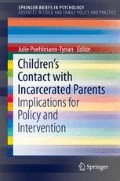Abstract
Approximately 11.7 million individuals were admitted to jails in the US in 2013, similar to the previous year, and national estimates indicate that 36 % of these individuals are parents of children under 15 years of age. Many children with parents who are incarcerated in jail or prison experience multiple risk factors and they are more likely to develop a host of health and behavioral health difficulties in childhood and adulthood compared to their peers. Maintenance of relationships with incarcerated parents is often seen as important for children’s well-being during the parental incarceration period, yet concerns have been raised about visitation in corrections facilities, especially visits involving security procedures or non-contact visits. The present study is the first to report observational data about young children’s visits to jails that used Plexiglas barriers or video monitors for visitation. Results of observations of 20 children indicated that children engaged verbally and visually with their incarcerated parents. They stayed in close proximity to the caregivers who brought them and engaged in an increasing amount of contact maintenance as the visit progressed. Children spent a surprising amount of time watching the visits occurring adjacent to them because of the lack of privacy during visits.
Access this chapter
Tax calculation will be finalised at checkout
Purchases are for personal use only
References
Ainsworth, M. D. S., Blehar, M., Waters, E., & Wall, S. (1978). Patterns of attachment: A psychological study of the strange situation. Hillsdale, NJ: Erlbaum.
Arditti, J. A. (2012). Parental incarceration and the family: Psychological and social effects of imprisonment on children, parents, and caregivers. New York: NYU Press.
Arditti, J. A., Lambert‐Shute, J., & Joest, K. (2003). Saturday morning at the jail: Implications of incarceration for families and children. Family Relations, 52(3), 195–204. doi:10.1111/j.1741-3729.2003.00195.x.
Baker, J., McHale, J., Strozier, A., & Cecil, D. (2010). Mother–grandmother coparenting relationships in families with incarcerated mothers: A pilot investigation. Family Process, 49(2), 165–184.
Bowlby, J. (1982). Attachment: Volume 1: Attachment (2nd ed.). New York: Basic Books.
Center for Disease Control. (2009). Adverse childhood experiences reported by adults—five states. Morbidity and Mortality Weekly Report, 59(49), 1609–1613.
Dallaire, D. H., Ciccone, A., & Wilson, L. C. (2012). The family drawings of at-risk children: Concurrent relations with contact with incarcerated parents, caregiver behavior, and stress. Attachment & Human Development, 14(2), 161–183.
Dallaire, D., Poehlmann, J., & Loper, A. (2011). Issues and recommendations related to children’s visitation and contact with incarcerated parents. United Nations Committee on the Rights of the Child, Day of General Discussion, Children of Incarcerated Parents. http://www2.ohchr.org/english/bodies/crc/discussion2011_submissions.htm
Eddy, J. M., & Poehlmann, J. (2010). Children of incarcerated parents: A handbook for researchers and practitioners. Washington, D C: Urban Institute Press.
Glaze, L. E., & Maruschak, L. M. (2008). Parents in prison and their minor children. Washington, DC: U.S. Department of Justice, Office of Justice Programs.
Kemper, K. J., & Rivara, F. P. (1993). Parents in jail. Pediatrics, 92, 261–264.
Minton, T. D., & Golinelli, D. (2014). Jail inmates at midyear 2013: Statistical tables. Bureau of Justice Statistics. Washington, DC: U.S. Department of Justice.
Murray, J., & Farrington, D. P. (2008). Parental imprisonment: Long-lasting effects on boys’ internalizing problems through the life course. Development and Psychopathology, 20(1), 273–290. doi:10.1017/S0954579408000138.
Murray, J., Farrington, D. P., Sekol, I., & Olsen, R. F. (2009). Effects of parental imprisonment on child antisocial behaviour and mental health: A systematic review. Campbell Systematic Reviews, 4, 1–105. Oslo, Norway: Campbell Collaboration. doi:10.4073/csr.2009.4.
Osborne Association. (2012). New York initiative for children of incarcerated parents fact sheet. Brooklyn: The Osborne Association.
Poehlmann, J. (2012). Jail-prison observation checklist. See Appendix A. University of Wisconsin-Madison.
Poehlmann, J., Dallaire, D. H., Loper, A. B., & Shear, L. D. (2010). Children’s contact with their incarcerated parents: Research findings and recommendations. American Psychologist, 65(6), 575–598. doi:10.1037/a0020279.
Poehlmann, J., & Eddy, J. M. (Eds.) (2013). Relationship processes and resilience in children with incarcerated parents. Monographs of the Society for Research in Child Development, 78(3): 75–93.
San Francisco Children of Incarcerated Parents Partnership. (2005). Children of incarcerated parents: A bill of rights. Retrieved from www.sfcipp.org
Sesame Workshop and Advisors: Adalist-Estrin, A., Burton, C. F., Gaynes, E., Harris, K. E., & Poehlmann, J. (2013). Little children, big challenges: Incarceration. Retrieved from http://www.sesamestreet.org/parents/topicsandactivities/toolkits/incarceration
Acknowledgements
This research was supported by grants from the National Institutes of Health (R21HD068581, PI: Poehlmann and P30HD03352, PI: Mailick) and the University of Wisconsin. The content is solely the responsibility of the authors and does not necessarily represent the official views of the NIH. Special thanks to Racine, Dane, and Sauk County Sheriff’s offices and jail staff for their support of the project; to Beverlee Baker, Susan Bulla, and Sue Nagelkerk from University of Wisconsin-Extension for their work on the project; to numerous undergraduate students for assistance with data collection and coding; and to the families who participated in this research.
Author information
Authors and Affiliations
Corresponding author
Editor information
Editors and Affiliations
Appendix A
Appendix A



Rights and permissions
Copyright information
© 2015 Springer International Publishing Switzerland
About this chapter
Cite this chapter
Poehlmann-Tynan, J. et al. (2015). Young Children’s Behavioral and Emotional Reactions to Plexiglas and Video Visits with Jailed Parents. In: Poehlmann-Tynan, J. (eds) Children’s Contact with Incarcerated Parents. SpringerBriefs in Psychology(). Springer, Cham. https://doi.org/10.1007/978-3-319-16625-4_3
Download citation
DOI: https://doi.org/10.1007/978-3-319-16625-4_3
Publisher Name: Springer, Cham
Print ISBN: 978-3-319-16624-7
Online ISBN: 978-3-319-16625-4
eBook Packages: Behavioral ScienceBehavioral Science and Psychology (R0)

